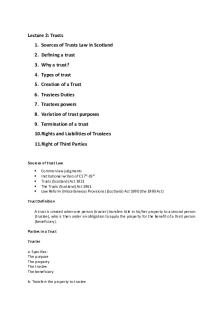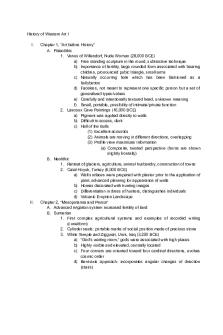Grandfather - NOTES PDF

| Title | Grandfather - NOTES |
|---|---|
| Course | Additional English |
| Institution | Christ (Deemed To Be University) |
| Pages | 2 |
| File Size | 46.3 KB |
| File Type | |
| Total Downloads | 136 |
| Total Views | 166 |
Summary
Download Grandfather - NOTES PDF
Description
Grandfather By Jayanta Mahapatra Jayanta Mahapatra is an Indian Poet. His style is simple and dealing with rel life problems and situations. The themes are often philosophical. He treats human emotions and sufferings in a very realistic way. This poem is based on the 1866 famine which struck Orissa. The poet writes about how the famine affected the lives of the people and in particular his grandfather who a staunch Hindu was compelled to convert to Christianity to escape the deadly clutches of hunger and poverty. He also deals in detail the dilemma, fear and humiliation experienced by the grandfather 1. The poet is reading the old diary of his grandfather. The words in the diary express the pain and suffering undergone by the grandfather. By reading it the poet comes to know about the painful and struggle-filled life of his grandfather and about the life at that time. 2. The climate was very hot and dry. The land was fallow and barren. The people are wasting away due to lack of food. Everything and everybody is at a blank not knowing hat to do. 3. The grandpa is faced with a very toughest question in life. He has become weak and is standing on the edge of life between living and dying. He was thinking about the decision he is forced to take for the sake of his family. He stands thinking about the dangers facing his and his family’s life and wondering what he should do. 4. The grandpa has spent several sleepless, cold and hungry nights foreseeing his on death and lacking the strength and ability to even cry at his own fate. 5. The grandpa was very young. He was defeated b the force of hunger and was made into a coward. So to protect himself and his family from dying due to hnger he converted to christianity. His will power has abandoned him and he abandoned the faith into which he was born and lived so far including all the rituals and practices and even the deities he has worshipped so far. 6. The pangs of hunger had completely changed him. The poet asks that if the faith and religion did not provide food and comfortable living then what is the use of sticking on to it. so he left his faith and took a new faith which he did not know anything about. 7. The life as a Christian chosen by the grandpa let him live while he still continued to be a Hindu deep in his heart. Now, in the time of comfort nd plenty, the poet and the on ry to talk abou the famine about which they have no real knowledge. 8. A gap years an understanding is between the poet and his son and between the poet and his grandfather. For the son, his future is very clear, bright and achievable. The poet wonders how his son will look at the life of the father and the grandpa. He thinks that he
will think their lives were nothing but a loss or failure. Now the poet and the son look at the life of the grandpa In silence. 9. The poet says that there is hope for the present generation. But the hope away from the grandpa. He makes a reference to the chess board and says how the move made by the grandpa whom he has not met has changed the life of the poet and his son. 10. The knowledge of the suffering and the sacrifice made by the grandpa maks the poet and his son to be silent. They want to know more about him and the type of life he had lived. They want to know how it will be to live giving dignity to escape from dying. (abandoning religion is considered an indignity). 11. The poet ends the poem with the note that the life of the grandpa and the decision made was terrifying and puts in a prayer that those situations should not repeat....
Similar Free PDFs

Grandfather - NOTES
- 2 Pages

Grandfather - Jayanta Mahapatra
- 3 Pages

POKU David OKAE - MY Grandfather
- 2 Pages

Notes
- 18 Pages

Notes
- 12 Pages

Notes
- 61 Pages

Notes
- 35 Pages

Notes
- 19 Pages

Notes
- 70 Pages

Notes
- 6 Pages

Notes
- 35 Pages

Notes LAW121 (A+ NOTES!)
- 99 Pages

Notes
- 29 Pages

Notes
- 70 Pages

Notes
- 6 Pages

Notes
- 19 Pages
Popular Institutions
- Tinajero National High School - Annex
- Politeknik Caltex Riau
- Yokohama City University
- SGT University
- University of Al-Qadisiyah
- Divine Word College of Vigan
- Techniek College Rotterdam
- Universidade de Santiago
- Universiti Teknologi MARA Cawangan Johor Kampus Pasir Gudang
- Poltekkes Kemenkes Yogyakarta
- Baguio City National High School
- Colegio san marcos
- preparatoria uno
- Centro de Bachillerato Tecnológico Industrial y de Servicios No. 107
- Dalian Maritime University
- Quang Trung Secondary School
- Colegio Tecnológico en Informática
- Corporación Regional de Educación Superior
- Grupo CEDVA
- Dar Al Uloom University
- Centro de Estudios Preuniversitarios de la Universidad Nacional de Ingeniería
- 上智大学
- Aakash International School, Nuna Majara
- San Felipe Neri Catholic School
- Kang Chiao International School - New Taipei City
- Misamis Occidental National High School
- Institución Educativa Escuela Normal Juan Ladrilleros
- Kolehiyo ng Pantukan
- Batanes State College
- Instituto Continental
- Sekolah Menengah Kejuruan Kesehatan Kaltara (Tarakan)
- Colegio de La Inmaculada Concepcion - Cebu